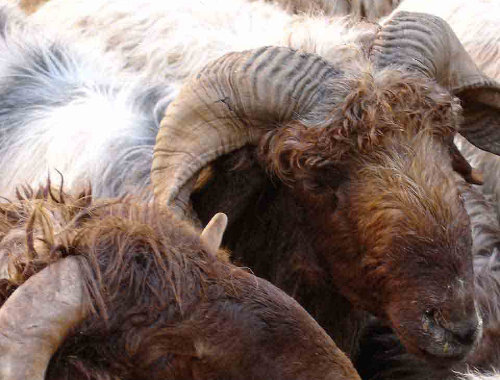This is post #41 in our series on Tafseer of Juz ‘Amma (click the link to see all posts in this series).
In the previous two posts, we discussed the first three quarters of this juz; now, we move into the final quarter. After describing some of the punishments of Hellfire, Allah says:
إِنَّ لِلْمُتَّقِينَ مَفَازًا
حَدَائِقَ وَأَعْنَابًا
وَكَوَاعِبَ أَتْرَابًا
وَكَأْسًا دِهَاقً
لَّا يَسْمَعُونَ فِيهَا لَغْوًا وَلَا كِذَّابًا
Translation: Indeed, for the righteous is attainment/success – gardens and grapevines, and full-breasted [companions] of equal age, and a full cup. No ill speech will they hear therein or any falsehood. [Surah An-Naba’, verses 31-35]
This is the fire-escape that you almost always see in the Qur’an — the balance of fear and hope. You rarely hear about Hellfire without Paradise, or vice-versa.
What is the benefit of knowing about these pleasures of paradise — pleasures that are not just physical, but spiritual (not hearing any false speech?) Isn’t it enough just to escape Hellfire?
The answer is that you should contemplate them and use them to motivate yourself to do more good deeds. We rarely do this; but the same way that certain punishments in the grave, on the Day of Resurrection, and in Hellfire motivate us, we should use specific rewards of Jannah to motivate us, too.
And who’s promising this? Imagine if you get a cheque in the mail (or an unsolicited email) saying “You just won $10M dollars!” Right away, you know from the sender that this couldn’t possibly be true.
But in this case?
جَزَاءً مِّن رَّبِّكَ عَطَاءً حِسَابًا
رَبِّ السَّمَاوَاتِ وَالْأَرْضِ وَمَا بَيْنَهُمَا الرَّحْمَٰنِ ۖ لَا يَمْلِكُونَ مِنْهُ خِطَابًا
Translation: – [As] reward from your Lord, [a generous] gift [made due by] account, [From] the Lord of the heavens and the earth and whatever is between them, the Most Merciful. They possess not from Him [authority for] speech. [Surah Naba, verses 36-37]
The reward is coming from no other than the Lord of the heavens and the Earth. The One who created all these things can surely deliver what He promised in these ayaat — this, and so much more.
يَوْمَ يَقُومُ الرُّوحُ وَالْمَلَائِكَةُ صَفًّا ۖ لَا يَتَكَلَّمُونَ إِلَّا مَنْ أَذِنَ لَهُ الرَّحْمَٰنُ وَقَالَ صَوَابًا
Translation: The Day that the Spirit and the angels will stand in rows, they will not speak except for one whom the Most Merciful permits, and he will say what is correct. [Surah Nabaa, verse 38]
But to get there — you have to go through the Day of Judgement first. Every single human being will go through that great and terrible day; a day when even the angels, who did not sin once, and Ar-Ruh (Jibreel), will stand in silence. Nobody will speak that day out of turn.
ذَٰلِكَ الْيَوْمُ الْحَقُّ ۖ فَمَنْ شَاءَ اتَّخَذَ إِلَىٰ رَبِّهِ مَآبًا
Translation: That is the True Day; so he who wills may take to his Lord a [way of] return. [Surah Naba’, verse 39]
That IS the promised day — Al-Yawm Al-Haqq. Subhanallah, when you recite this with tajweed, you really feel that hard stop on the shaddah of the qaaf in haqq.
And the choice is yours — “fa man shaa,” so whoever wishes, they can go back to their Lord. And finally, the surah concludes with:
إِنَّا أَنْذَرْنَاكُمْ عَذَابًا قَرِيبًا يَوْمَ يَنْظُرُ الْمَرْءُ مَا قَدَّمَتْ يَدَاهُ وَيَقُولُ الْكَافِرُ يَا لَيْتَنِي كُنْتُ تُرَابًا
Translation: Indeed, We have warned you of a near punishment on the Day when a man will observe what his hands have put forth and the disbeliever will say, “Oh, I wish that I were dust!” [Surah Naba’, verse 40]

All this is just a warning of a punishment that’s close, very close — as close as your own death. A warning of things to come, and a day where every human will see what their hands sent forth to the Hereafter.
And this final, curious statement of the kaafir — what does it mean, that he wishes he’ll be dust? Abu Hurayrah mentions that the Messenger of Allah said:
On Resurrection Day, the rights will be paid to those to whom they are due so much so that a hornless sheep will be retaliated for by punishing the horned sheep which broke its horns. [Saheeh Muslim]
That is to say, imagine two sheep, one of which has horns and one doesn’t. In the dunya, the one without horns harmed the one with horns; and in the akhirah, they will be resurrected, and justice will be metted out to both.
After this, all the animals will turn to dust; and the kafir, who did worse than this, who wronged more than this, will wish that his punishment was this light — dust, and to be nothing more.
May Allah allow us to understand this great day and implement the many, many great lessons of this amazing surah.
References:
- Touched by an Angel: Tafseer of Juz ‘Amma. By Muhammad Alshareef. 2010.